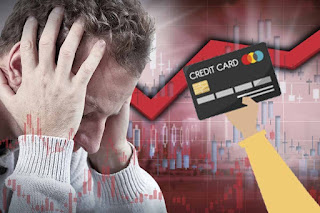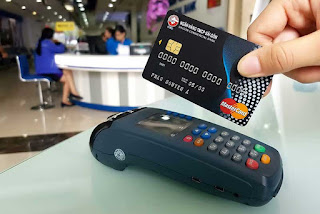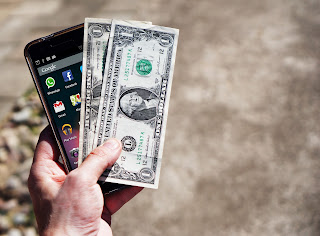To maintain your personal finance you need to step up with the help of this "Your Finance Formulas" blog. Where I am trying to share all of my favorite financial videos, I do believe these videos will make you financially confident & update too. If you have any informative finance video please feel free to share with me & also share your feedback for my betterment.
Saturday, November 21, 2020
Is it legal to pay off debt with a credit card?
Monday, August 20, 2018
5 Personal Savings Tips to Put Your Savings on Auto Pilot
Thursday, February 8, 2018
Credit: Is It Always Bad?
Wednesday, December 6, 2017
Financial Habits That Everyone Should Adopt In 2018
Saturday, November 18, 2017
Making The Best Of A Bad Situation
Tuesday, August 1, 2017
6 Traveling Hacks That Still Save You Money
Tuesday, November 19, 2013
Keep Your Finances Safe Online
Wednesday, March 6, 2013
Credit card myths busted
To clear things up, let’s bust some credit card myths.
Myth #1: There is a credit blacklist
Some people believe that if you are refused for credit, you have debt or you have County Court Judgements (CCJs), then your name will be included on a credit blacklist and that no lender will go anywhere near you.
This myth is completely unfounded – there is no such thing as a universal credit blacklist. It is true that your credit history plays a part in whether you’ll be approved when you apply for a credit card, but not all lenders are looking for the same things. Besides, anything that has gone wrong in your credit history can be remedied and you can improve your credit rating with a few simple measures.
Myth #2: All lenders and credit agencies use the same credit scoring system
Similar to the myth about credit blacklisting, some people believe that all lenders and credit reference agencies (the companies that lenders use to carry out credit checks) use exactly the same credit scoring system. If this were true, you would not be able to get an application approved anywhere if you were turned away by one lender.
Luckily, this myth isn’t true. Credit reference agencies will use many of the same methods and tools to get information about you and your credit history, but in truth, each lender will have their own specific wish list for their ‘perfect customer’. This often relates to how much profit they can make from you rather than just the risk you represent.
So, if you are rejected by one lender, this doesn’t automatically mean that all others will turn you down.
Myth #3: Checking your credit record can damage your credit score
It is thought by some that by checking your credit record, through a credit reference agency (usually for a small fee) can damage your credit rating. No one really knows where this myth came from, as it is completely untrue. Checking your credit record has no effect on your score and it can actually be very useful as it allows you to identify areas you need to improve on to boost your rating, as well as giving you the chance to correct mistakes in the information held about you.
Knowing that you have a fully accurate credit record, and with the reassurance that your credit score is good, you can get on with finding the lowest interest rates and getting the best credit card balance transfer deals.
Monday, September 17, 2012
Pockit credit cards- A student's guide to credit cards
 If used sensibly, a credit card can be a good way for students to manage their budgets.
If used sensibly, a credit card can be a good way for students to manage their budgets.What is available?
Currently Halifax, Lloyds TSB, Natwest and Royal Bank of Scotland offer student credit cards. Other providers have credit cards for people with a low income or no credit history that may also be available to students.
Student credit cards have higher interest rates so borrowing on a student credit card is ill advised. A student loan and student bank account are the best options to fund students through university.
Student credit card providers offer up to £500 credit which will not have interest applied if the balance is paid in full each month. Once in debt, a monthly minimum payment is still required and an unpaid balance will accrue interest and late payment charges. Further charges apply for exceeding the credit limit.
The advantages and disadvantages
Section 75 of the Consumer Credit Act provides protection for credit card purchases over £100. The protection, which is not provided by debit cards, means that the credit card provider will be able to assist and provide a refund where there are unresolved matters between the buyer and seller
Credit ratings tell lenders how financially attractive you are and whether you are a responsible borrower. Building a good credit rating through a credit card or mobile phone contract can improve your chances of obtaining future credit, perhaps for a car or mortgage after university. However, becoming in debt through a student credit card will have a negative impact on your credit rating and will affect future applications for credit.
Managing your credit card positively
Keeping track of your spending so as not to exceed your budget and paying the balance off in full each month are the best ways to avoid debt.
Furthermore, withdrawing cash using a credit card will incur a withdrawal fee so stick to your student bank account for this purpose.
By checking your credit card statement each month you will be able to spot any unexpected purchases early. These may indicate fraud and you should make your credit card provider aware as soon as possible.
Alternatives
Mature students or those with an additional income might be eligible for a regular credit card with better interest rates or additional benefits.
A pre-paid card, to which money can be transferred before using the card for spending in shops and online, is a good alternative to a student credit card. Since pre-paid cards work in a similar manner to mobile phone top up cards, getting into debt is unlikely with this option.
Monday, April 23, 2012
Ways to Consolidate Credit Card Debt
 With the economy seeing so many people struggling to make ends meet, it is quite common that people are relying heavily on credit cards and loans to keep up with bills and the rising prices of utilities, groceries, etc.
With the economy seeing so many people struggling to make ends meet, it is quite common that people are relying heavily on credit cards and loans to keep up with bills and the rising prices of utilities, groceries, etc. While this may fix the problem, unfortunately it can also end up leading to someone owing quite a bit of money that can quickly become hard to handle.
Going back to school to earn a business degree may help find a position or even start your own business, but with jobs so few and far between and business folding each day, there is no guarantee that it will help. Business Schools can help connect you with accredited business programs.
Some may consider bankruptcy as a way to erase this debt. However, it can mess up your credit and make it difficult to get back in good financial standing.
A great way to help make your monthly payments manageable is to consider consolidating your credit card debt.
What is Consolidation?
When you consolidate your credit card debt you are taking the balance from each card, putting it together, and creating one monthly payment that people usually find much easier to handle.There are several ways to consolidate your credit card debt. The option you choose depends on your personal preference.
Personal Debt Consolidation Loans
One of the most utilized options is that of the personal debt consolidation loan.A popular loan choice is a home equity loan. When you take out a home equity loan you are borrowing money against what your house is worth. This basically means that you are using your house as collateral.
Speaking of using your home, if rates are lowering than they were when you purchased the home, you can utilize what is referred to as a cash-out refinance, meaning you can refinance your mortgage loan and receive a portion of the value to use towards your bill.
If you are uncomfortable using your home as collateral for your loan, you can speak to someone at your credit union or bank about getting a personal loan. If you plan to utilize a personal loan from your financial institution it is important that the interest rate offered is less than what you are currently paying on your debts or you can actually end up paying more that you already do.
More Options
Should you decide that a personal loan is not for you, you can consider:- Borrowing money from your current bank accounts, stocks, or retirement funds.
- Borrow money from a friend or family member.
- Transfer your balance to a new credit card with a lower interest rate.
- Contact a company that specializes in debt consolidation to see what options are available for you.
Source: My Two Dollars
Monday, March 12, 2012
Poor or No Credit? Here’s What You Should Know
Is a Credit Card Right for You?
Before you start the process of applying for a credit card, it’s important to determine if a credit card is right for your needs. A credit card is best for smaller purchases that can be fully paid over several months. If you are looking to make a large purchase, a personal loan may be a better option for you. Consult with your bank about the various options for a personal loan including a secured loan. Before signing up for a credit card, confirm the terms of agreement. This includes the interest rate, your maximum credit limit and any related fees such as over-the-limit charges. Make sure you can afford the minimum payment. Bad credit tends to follow you around for many years and can make it difficult to obtain credit in the future.
Poor Credit History
Some lenders look at more than just your credit history when making a decision. If there are issues on our credit report that are not your fault, it’s important to mention this either on the application or when contacting the lender. A divorce, for example, may make your credit look bad even if you weren't responsible for the credit issues with your accounts during your marriage. If a lender is willing to look at merit, present proof that you have a steady source of income and are capable of paying the minimum payment each month. It usually takes about 2-3 weeks to receive a decision about your application for most cards. If you are not approved, you have the right to ask for the reasons why you were not approved and request a free copy of your credit report.
Little to No Credit History
Another reason you may be turned down for a credit card is lack of a credit history. If this is the case, there are a few ways to get around this issue. The easiest way is to have your name attached to another card holder's account. This allows you to demonstrate responsibility and build a credit history. You want to make sure the other person on the card has a good credit history, at least with that particular card. A joint account holder's bad credit with that particular card carries over to your credit report. Another option is to obtain a debit card through your bank. This allows you to build a credit history in a controlled setting. Keep in mind that with a debit card you are limited to the funds you actually have available in your account.
Note: Surprisingly, you may have difficulty getting approved for a credit card if you pay off your balance on other cards every month or only have a card that requires you to pay the balance off every month. Consider getting something like a gas card that carries a small balance over to the next month.
Your first step should be obtaining a copy of your credit report. Legally, a company that turns you down for credit must give you a reason. Credit reporting agencies are also required to respond to any disputes you may have with a billing issue within a specific amount of time. If they do not, any negative marks on your credit report must be removed. If there are issues with your credit report, contact these agencies first. You may want to review the Fair Credit Reporting Act or contact a credit repair company. Your second step is to compare your credit card options. Make sure you are aware of any fees and potential penalties. Credit can be a valuable asset, as long as you are aware of your options, rights and responsibilities as a card holder.
Andrew Bennett is a finance consultant who suggests obtaining a credit card to rebuild credit history once it has been damaged.
Thursday, April 2, 2009
Avoid credit card fraud.......with the help of his experience, Have a look.
Now most of people are using credit cards but fraud cases related to this credit cards are increasing day by day. The reason behind this fraud is we are not at all aware about the safety steps which we suppose to follow.
In this video one of the credit card user has shared his experience of "credit card fraud". I think it may help all of you.
Thanks "You tube" for this informative video.
So like this if you have any experience related to this topic please feel free to share with me.






